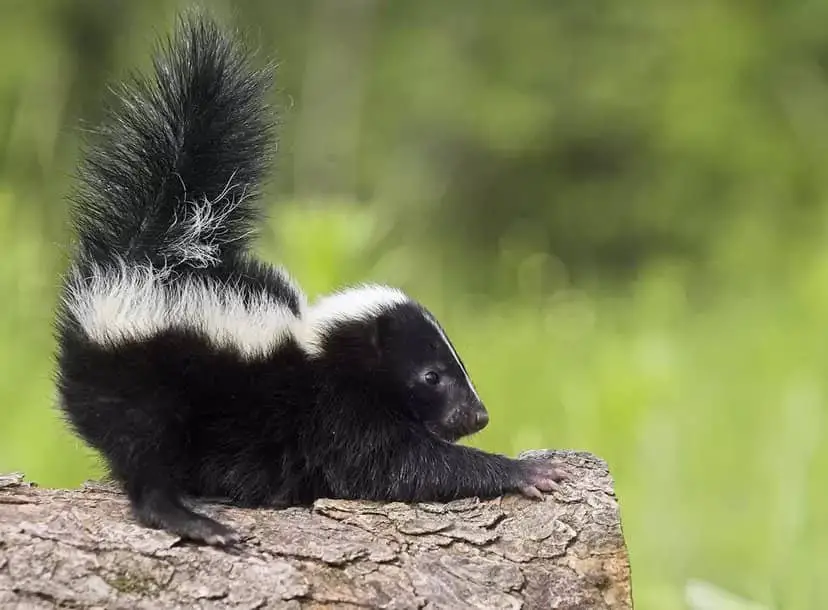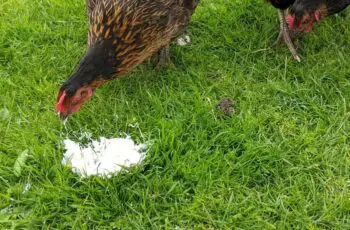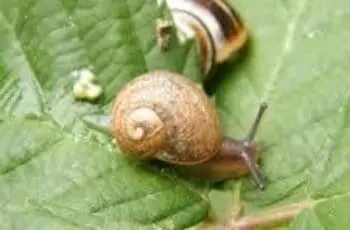When we hear about skunks, most people think of the infamous spraying behavior that these animals are known for. But how old are skunks when they can spray? And what causes a skunk to spray?
Well, skunks can start spraying as early as 3 months old. This is because the development of the anal glands is not linked to sexual maturity. Instead, it is determined by the amount of daylight exposure that young skunks experience. That said, even baby skunks are capable of spraying if they feel threatened.
How Many Times Can A Baby Skunk Spray?
A baby skunk can spray 3 times in a row before it needs to take a break, while an adult skunk can spray 6 times, double that. Skunks use their furry tails to disperse the stink, and they can aim their stinky secretions quite accurately.
The stench of skunk spray is so potent that it can be detected by human noses from up to a mile away. And it’s not just the smell that’s off-putting – skunk spray can also cause temporary blindness if it gets in your eyes. So it’s best to admire these striped critters from a safe distance.
How Far Can A Skunk Spray Go?
Studies have shown that a skunk can spray up to 15 feet. And while that may not seem like a very long distance, it’s important to remember that the spray is very concentrated. This means that even if you’re standing well outside of the spray range, you could still end up with a face full of skunk scent.
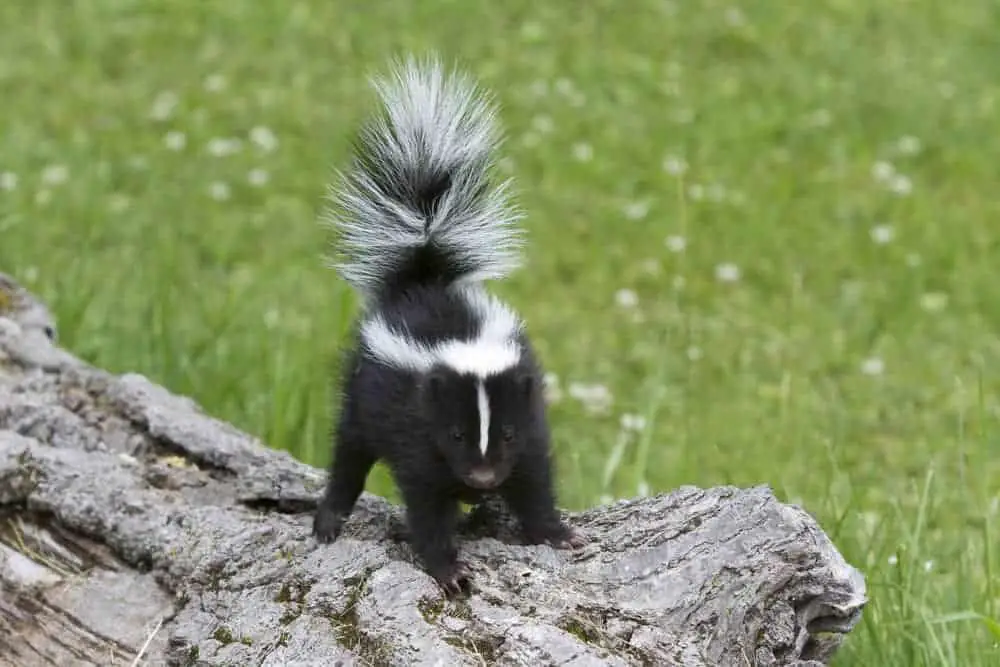
How Old Are Skunks When They Can Spray
What Causes A Skunk to Spray?
When a skunk feels threatened, it will often spray a noxious liquid as a form of self-defense. This liquid is composed of various chemicals, including sulfuric acid, mercaptans, and thiols. These substances are incredibly foul-smelling and can cause irritation if they come into contact with skin or eyes.
However, skunks will usually give warning signs before they spray, such as hissing, stamping their feet, or raising their tails. If these warnings are ignored, the skunk will then turn around and spray its attacker with the noxious liquid. In most cases, the skunk will aim for the eyes, as this can be the most effective way to deter an attacker. Thankfully, skunks generally only spray as a last resort and will only do so if they feel that their safety is truly at risk.
How Old Are Skunks When They Leave The Nest?
Skunks are born blind and deaf, and they are completely reliant on their mother for up to 8 weeks of their lives. They open their eyes at around two weeks old, and they are usually able to leave the nest and start exploring on their own by the time they are six weeks old.
After that, they will be fully independent and will only see their mother again during the breeding season. Given the short amount of time that skunks spend with their mother, it is not surprising that they reach sexual maturity at a young age. Female skunks can begin breeding when they are just eight months old, while males typically wait until they are around a year old.
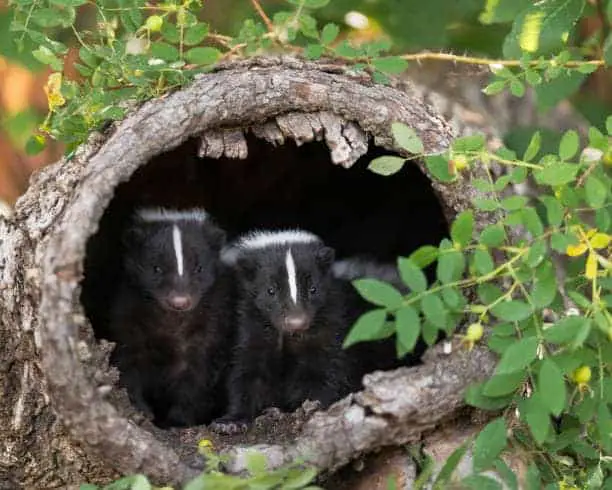
How Old Are Skunks When They Can Spray
Why Would A Skunk Not Spray?
A skunk’s spray is a powerful defense mechanism that is used to deter predators and other threats. The spray is composed of a mixture ofaffeine, thiols, and other chemicals that cause an intense burning sensation.
However, there are several reasons why a skunk might choose not to spray. For instance, the skunk may be too young or too old to produce the spray. The skunk may be ill or injured, which can affect its ability to produce the spray. Finally, the skunk may have already used its spray and needs time to replenish its supply. Ultimately, there are many reasons why a skunk might choose not to spray, but the most likely reason is that it simply doesn’t feel as much threatened as spraying.
Do A Skunk Spray Another Skunk?
Skunks use this foul-smelling liquid as a defense mechanism, spraying it at predators (or, sometimes, unsuspecting humans) in order to deter them. But do skunks ever spray each other?
It turns out that skunks generally don’t spray each other, but there are a few exceptions to this rule. For example, mother skunks will sometimes spray their young if they feel threatened or if they want them to leave the nest. Male skunks may also spray each other during the mating season in order to assert dominance over one another. Outside of these, however, skunks generally don’t seem to have any reason to spray each other.
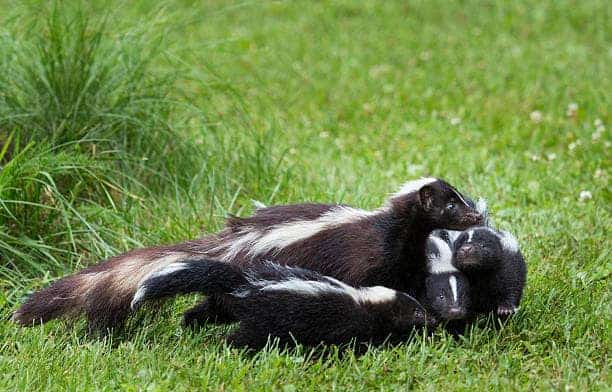
Skunk
Do All Skunks Spray?
All skunks are able to spray their predators with a foul-smelling liquid. However, not all skunks will spray unless they feel threatened. If a skunk does not feel threatened, it will usually just try to run away from the predator. Some skunks will only spray when they are provoked or if they are caught by surprise. Even if a skunk does not want to spray, it may do so if it is scared or feels cornered. In general, all skunks can spray but they only do if they are well threatened.
What To Do If A Skunk Smelled At You?
If you find yourself the victim of a skunk spray, there are a few things you can do to remove the scent. First, try washing the affected area with soap and water. This will help to remove some of the oils that carry the odor.
Next, apply a solution of vinegar and water to the area. Vinegar helps to neutralize the odor-causing molecules. Finally, consider using a commercial skunk odor remover. These products contain enzymes that break down the oils that cause the smell. By following these steps, you can rid yourself of that pesky skunk smell.
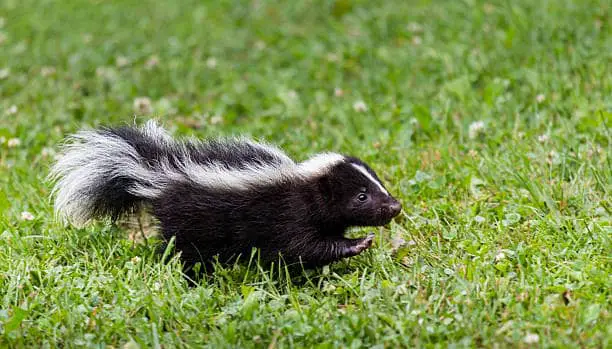
Skunk
How To Get Rid of Skunk Smell In The House?
Aside from their cutness, skunks sure can make a mess! If you’ve ever had a skunk spray your house, you know just how difficult it can be to get rid of the smell. But don’t worry – there are a few things you can do to remove that pesky skunk odor.
First, open all the doors and windows to air out the house. You may also want to turn on some fans to help circulate the air. After a few hours, the smell should start to dissipate.
If the smell is still strong, you can try using a mixture of baking soda and vinegar. Simply combine equal parts baking soda and vinegar in a bowl, then apply the mixture to any affected areas. Let it sit for 30 minutes, then wipe away with a damp cloth.
If all else fails, you may search for the odor with your nose. Follow the scent and find where its the most. Sometimes people mistaken skunk smell with sewer gas as they can smell pretty similar.
Where Do Skunks Live?
Despite spraying, skunks are actually very clean animals, and they take great care in grooming themselves and their young. So where do these interesting creatures live?
Just like chipmunks, skunks will also set up dens in abandoned buildings or burrows that have been dug by other animals. Skunks typically mate in the spring, and they give birth to litters of four to six kittens. The kittens remain with their mother for several months before striking out on their own.
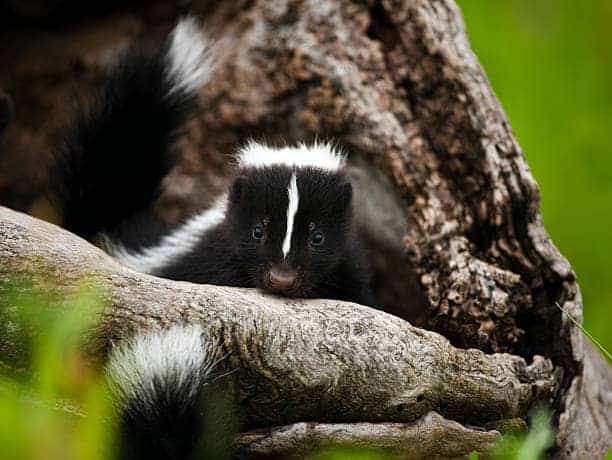
Skunk
How To Avoid Skunk Spray?
The best way to avoid being sprayed by a skunk is to keep your distance. If you see a skunk, give it plenty of space and do not try to approach it.
If you have pets, make sure they are not allowed to wander into areas where skunks are likely to be found. Be especially careful at night, as skunks are more active after dark. If you do find yourself in close proximity to a skunk, do not panic or run away. This will only frighten the animal and increase the likelihood of being sprayed. Instead, slowly back away from the skunk while keeping an eye on it.
If you are sprayed by a skunk, the first thing you should do is ventilate the area. Open all the windows and doors and turn on any fans that you have. The next step is to wash the affected area with soap and water. You may also want to shampoo your hair if it has been sprayed. Finally, if the smell persists, you can try using a commercial deodorizer designed for removing skunk odor.
How to Get Rid of Skunks In The House?
Getting rid of skunks in the house can be a tough task. Skunks are nocturnal animals and are attracted to small, dark spaces. They will often take up residence under decks, in crawlspaces, attics, and in other areas where they feel safe from predators. In addition to being smelly, skunks can also be dangerous, as they can attack and spray family members or pets.
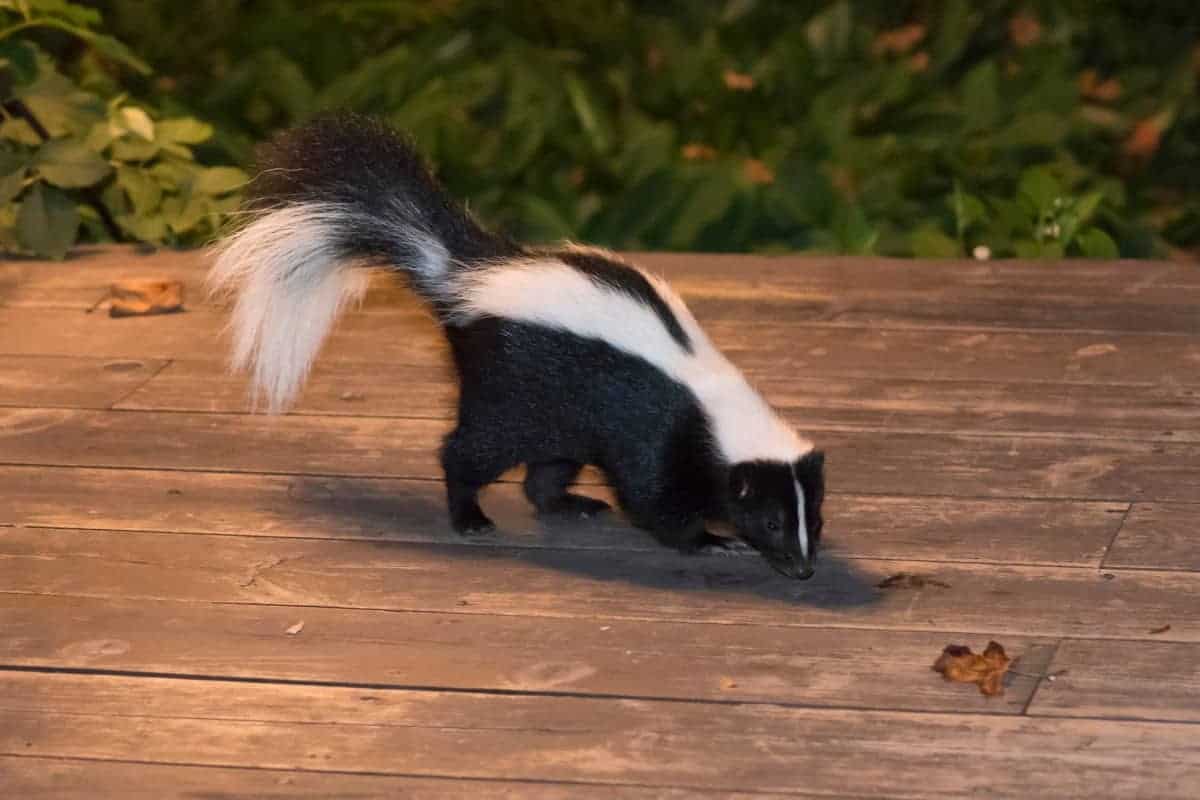
Remove Shelter
If you think you have a skunk living in your home, the best course of action is to fill up those holes during the night when they are out. You should make sure to eliminate any potential shelter sites, such as piles of wood or hollow logs.
Remove Food Sources
Skunks are often attracted to yards and gardens in search of food. If you have a skunk living under your deck or porch, chances are it’s because there’s an easy food source nearby. The best way to get rid of skunks is to remove their food source. This may mean trimming back vegetation, picking up fallen fruit, and securing garbage cans.

